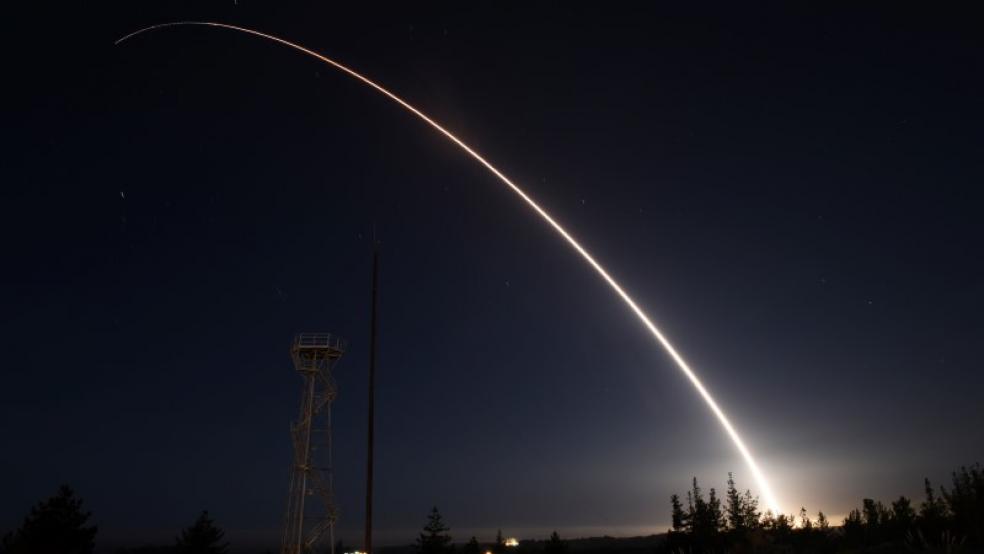President-elect Donald Trump on Friday appeared to signal that he is open to a new nuclear arms race. His soon-to-be counterpart in Russia, President Vladimir Putin, said that if one has begun, it wasn’t the Kremlin that started it.
The two statements kicked off a second day of anxious theorizing about what role the two men believe nuclear weapons will play on the international stage in coming years.
Related: Was Trump’s Nuclear Tweet a Poke at Putin?
The issue came to the public’s attention Thursday, when Putin delivered a speech to the Kremlin’s Defense Ministry Board in which he vowed to continue Russia’s massive investment in upgrading its military. He said, in part, “We need to enhance the combat capability of strategic nuclear forces, primarily by strengthening missile complexes that will be guaranteed to penetrate existing and future missile defense systems.”
It wasn’t precisely clear what he meant by “strengthening missile complexes” (language that the Kremlin provided in its own translation of the speech into English.) But the remarks could be read as a reference to an expansion of Russia’s nuclear arsenal -- something that both the U.S. and Russia have avoided doing for the most part since the Reagan administration.
Trump responded with an equally vague statement, delivered on Twitter: “The United States must greatly strengthen and expand its nuclear capability until such time as the world comes to its senses regarding nukes.”
In a wide-ranging, four-hour press conference on Friday, Putin returned to the topic of nuclear weapons and was asked about the possibility of reviving the arms race that defined the Cold War era. He said that if a new arms race occurs, or indeed if one has already started, it will be due to the George W. Bush administration’s decision to pull out of the Anti-Ballistic Missile treaty with Russia in 2002.
Related: Russian State Media Warns that Trump Is Facing a ‘Coup d’Etat’
The Bush administration’s controversial decision to withdraw was made, officials said, because the country needed to be able to develop an effective nuclear “shield” against attacks from rogue states that were not a party to the treaty.
“When one party unilaterally withdrew from the treaty and said it was going to create an anti-nuclear umbrella, the other party has to either create a similar umbrella – the necessity of which we are not sure about, considering its questionable efficiency – or create effective ways to overcome this anti-ballistic missile system and improve its strike capabilities,” Putin said Friday.
While Russia is upgrading its nuclear capabilities, he denied that doing so constitutes an arms race. “If anyone is unleashing an arms race, it's not us ... We will never spend resources on an arms race that we can't afford.”
He claimed that the United States is upgrading tactical nuclear weapons in several NATO countries, saying to a BBC reporter, “I hope that your program audiences and Internet users know about that.”
Related: Team Trump Is Singing from Putin’s Songbook on DNC Hacks
Not long afterward, Trump delivered another statement on nuclear weapons, this time through television host Mika Brzezinski, on the MSNBC program Morning Joe. Brzezinski said that she had spoken with Trump Friday morning and that the president-elect told her he wasn’t worried about an arms race -- not because he doesn’t believe it will happen, but because he believes the U.S. would win it.
“Let it be an arms race,” he told her, Brzezinski said. “We will outmatch them at every pass and outlast them all.”
Later, Sean Spicer, the incoming White House press secretary, struggled to push back against the idea that his boss was blithely inviting nuclear proliferation.
He told NBC host Matt Lauer that there won’t be an arms race, but that “other countries need to be put on notice that he is not going to sit back and allow them to undermine our safety, our sovereignty ... He is going to match other countries and take action.”
When Lauer pointed out that matching other countries advances in weaponry is practically the definition of an arms race, Spicer again insisted that nothing like that was going to happen, because Trump “is going to ensure that other countries get the message he is not going to sit back and allow that ... What’s going to happen is they will all come to their senses and we will all be just fine.”
Perhaps concerned that all the discussion about nuclear weapons was making people nervous, the Trump transition team late Friday morning, released a letter that Putin sent to Trump. Dated December 15, it offers holiday greetings and notes that “relations between Russia and the U.S. remain an important factor in ensuring security and stability of the modern world.”
It continues, “I hope that after you assume the position of the President of the United States of America we will be able—by acting in a constructive and pragmatic manner—to take real steps to restore the framework of bilateral cooperation in different areas as well as bring our level of collaboration on the international scene to a qualitatively new level.”
In a brief statement, Trump called it “a very nice letter” and said, “[H]is thoughts are so correct. I hope both sides are able to live up to these thoughts, and we do not have to travel an alternate path."





